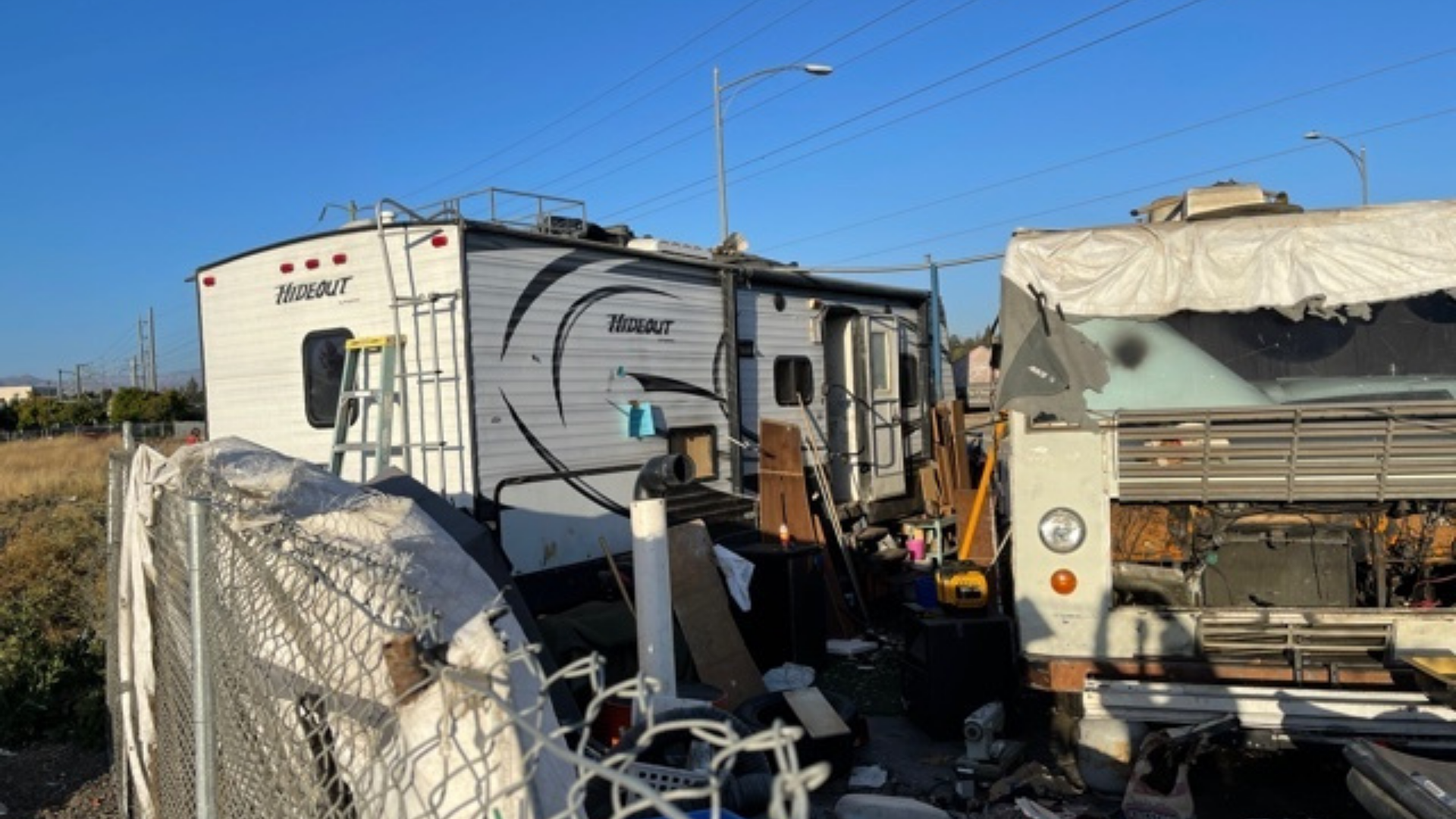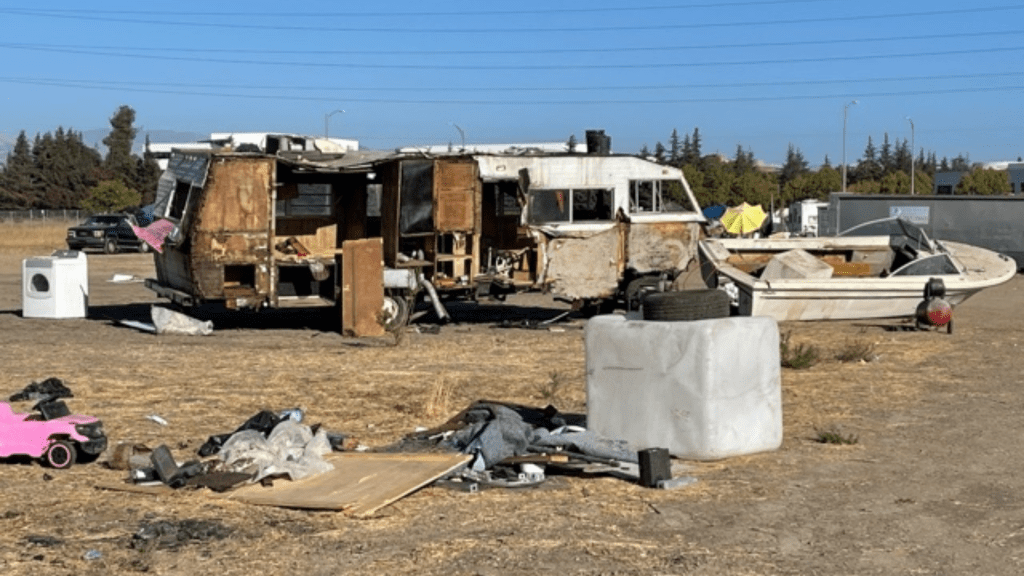Apple has begun clearing a large homeless encampment on a chunk of its undeveloped property in North San Jose, spending millions of dollars to move unhoused people living there into motel rooms and other forms of temporary housing for several months.
The sprawling camp, which had become home to dumpsters, porta-potties, tents, RVs, beaten-up vehicles, and handmade structures over the past several months, had cropped on 64 acres of Apple-owned land near PayPal’s corporate headquarters.
Videos by VICE
The Apple encampment also wasn’t too far off from another massive group of unhoused people congregated at the Norman Y. Mineta San Jose International Airport.
One “final cleanup notice” sign on the Apple property, sent to VICE News by local homeless advocate Richard Scott, said people and property had to be out by 7 a.m. Thursday, but it also said the cleanup would last a week. It noted that “housing and community resources” were available to people living there.
Advocates said that while some homeless people had been living on the Apple site for years, the encampment grew in size this summer, hosting anywhere from 30 to 100 people at its peak. (One county official said a count a few weeks back found about 70 people.) They’d been relatively undisturbed—a rarity for unhoused people, who are often shuffled from place to place.

As the encampment received more attention, though, Apple announced it would be contracting with HomeFirst, a local nonprofit working with Santa Clara County’s homeless community, to ensure people on the property would have access to housing options and casework resources, essentially clearing out the camp.
Apple is spending millions on the endeavor, though the company hasn’t publicly said just how much the deal is worth. In a statement last month, Apple said it’d “been closely coordinating with local partners for several months to identify housing alternatives and support for families who will be transitioning away” from the encampment, located on Component Drive.
Lynn Shipman, one of the homeless people who lived on the Apple site, said HomeFirst recently approached her and offered a motel room, which she accepted. It means she gets fed twice a day, she noted.
Shipman had previously resided in a travel trailer on the Apple site for about five months, camped out on a slice of the property that was once home to 21 people. Many of them are at the hotel with her now, though she still doesn’t know where some others have gone.
Generally, she said, people seem pretty happy with the deal, but they are still wary of what they’re being offered.
“I think they can afford it, and hip hip hooray,” Shipman said of Apple. “I’m glad we’re getting a little leg up here.”
HomeFirst CEO Andrea Urton told VICE News those living at the site had been given a few options to relocate and receive nine months of temporary housing—emergency shelter, a motel bed, or a “safe parking site” in partnership with the city—plus 12 months worth of case management.
While some homeless advocates have said that they’ve gotten little information on the safe parking location—like where it’s located, for example—Urton said they’re currently working with the city to “stand up” the site with utilities to ensure it’s safe. As of Friday, it had not opened.

Santa Clara County Supervisor Otto Lee told VICE News he thought the program was a “good way to get folks away from these sites and living in tents, especially now that we’re this close to the fall,” when temperatures will drop.
“This is a really important time to start moving folks outside to indoors … The winter can get really nasty,” Lee said. “We have people dying in our streets because of that.”
It wasn’t immediately clear how many people at the Apple site wound up taking the offer for housing. But the goal is to eventually find a longer-term solution for everyone who accepted help.
HomeFirst has been helping people move out since last week, and one advocate, Shaunn Cartwright, told VICE News that people will be escorted off the site Friday if they don’t participate in the housing program.
One local homeless advocate, R.J. Ramsey, told VICE News Wednesday that the encampment had already been “decimated.” There were backhoes there cleaning trash out, he said. Shipman also said people weren’t allowed to bring in trucks to pull trailers out Thursday, and could only walk in on foot.
“Most of the motorhomes that could run are now gone, and there’s hardly anybody here,” Ramsey said. “Just a few people walking around picking up their belongings.”
Apple wanted to make sure the property wasn’t cleared without offering people a better solution first, including support to resolve their homelessness entirely, Urton said.
“They have put millions of dollars [toward this]—and some people will balk at that and say, ‘Well, it’s one of the richest companies in the world, they could’ve done more,” Urton said. “Let me be clear: Apple is working on several different levels here, and I’m really impressed with their leadership and the decisions they’re making.”
The company committed $2.5 billion to addressing California’s housing crisis in 2019, joining a slew of tech behemoths announcing similar initiatives, for example. Even so, Silicon Valley’s relationship with the poor and working-class communities overrun with their workforces and glistening headquarters can be tenuous at best. As the tech industry expanded, the region’s painful housing crisis grew considerably worse—in part because the Bay Area has so few homes available to buy—forcing some people onto the street.
Now, it’s not uncommon to see homeless encampments butting right up against multimillion-dollar properties, and corporate tech campuses
For Shipman, this wasn’t even her first experience interfacing with a tech giant in the Bay Area. She once lived in an encampment outside of a Tesla building in Fremont, though city crews later swept the site. She didn’t know the San Jose land was owned by Apple when she moved in, but she’s happy they’re stepping in now.
Still, massive investments in affordable housing have never been more necessary, especially now that a federal moratorium on evictions has expired. If every private company chipped in like Apple and Amazon—which recently donated $100,000 to support a homeless shelter for LGBTQ people in San Jose—solving homelessness might be feasible, Urton said. And there are nearly 10,000 people who still need a house in Santa Clara County.
(Amazon also had a homeless shelter built into its urban Seattle campus, though advocates have long noted that founder Jeff Bezos alone could probably afford to house all 580,000 homeless people in the U.S., considering he’s the wealthiest man in the world.)
“Quite frankly, our city and counties are working around the clock. They have been for almost two years. And they’re short on resources,” Urton said. “They must be exhausted. I know we are, ‘cause we’ve been partnering with them every step of the way. And in order to solve homelessness, we’re going to need the for-profit sector to really lean in and support with the resources that they have.”
Still, the transition away from the Apple site hasn’t gone perfectly for everyone. For example, Shipman said that people were offered help with their vehicles and RVs, like getting set up with tags and registration, but have not received it.
One woman at the site, Marie Velez, burst into tears while talking to VICE News about the encampment’s end. She’d been living there for a year and a half before she was promised help, she said.
“They put me in a motel room for four days and then they kicked me out,” Velez said.“It doesn’t make sense.”
She said she was told there were no more rooms available, but that she may be able to park in a “safe parking place,” where she said she’d get fewer benefits.
Urton said everyone who wanted help has gotten it. While Velez lost her room—though not because she was removed, according to HomeFirst—she was scheduled to be back in a room Friday.
Still, the motel program has rules, and there are consequences if they’re repeatedly violated.
Sara Smith, a mother and carpenter who had lived in a handmade structure on the site, said that she’s been threatened with removal from her room, which is at a different hotel from everyone else. She and her kids were already kicked out of one hotel for making too much noise.
“They said if I get kicked out of this one, then I will get kicked out of the program,” Smith said.
UPDATE 9/3: This article has been changed to reflect an additional clarifying statement from HomeFirst about Marie Velez.







